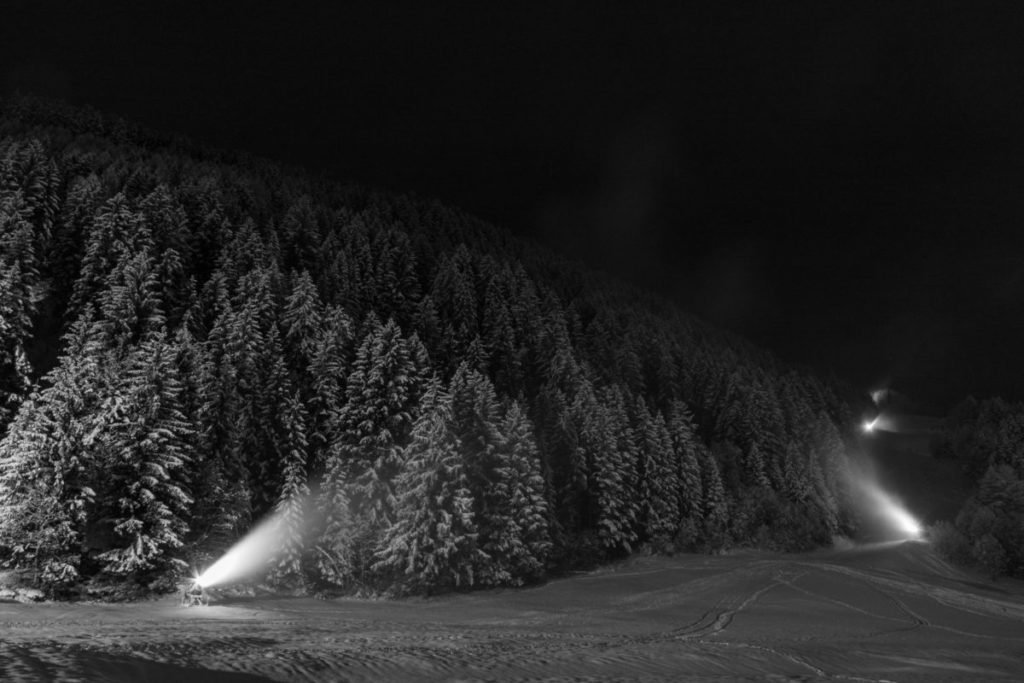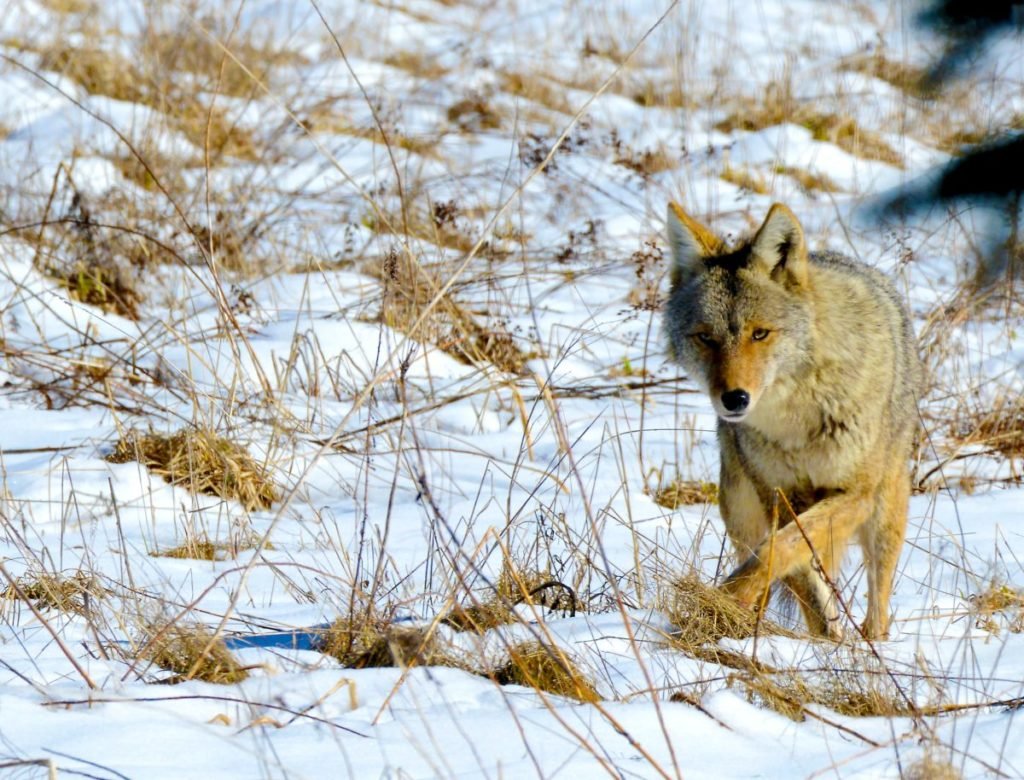The dog had gotten out, slipped out, wriggled out, sneaked out. Too smart for her own good—clever at door latches, willing to bide her time when the mood was on her to go solo. You’d think it was too cold to want to walk the wild side—somewhere near zero. Kit would go call her in a minute, stand in the pool of light at the kitchen door call Lillie, Lillie. Too late, too dark, too cold to let the dog just return—as she always did—in a few hours.
Kit pulled on her jacket, stepped into the cold. Stood there long enough that the row of pines at the edge of the woods took on its dark black-on-black profile against the sky. She paused a beat, heard again the barred owl she had heard earlier in the week, seen over her ceramics studio, the one-time shed-and-chicken coop of a small woods-edge farm that had ceased being a farm long before Kit bought it. Whooo-cooks-for-you, who-cooks-for-you-all.

Lillie? Lillie? Where are you, girl?
Eventually, the dog the color of soot, would return, twigs caught in her coat. It was a no-questions-asked-just-glad-you’re-home deal whenever she returned from an escape—usually a daylight thing, sometimes when the pair of them were out for a woods walk, her voice Lillie’s only tether. No bad-dog recriminations when she returned, but no walks off the leash for a few days. Greater attention would be paid to making sure the latch on the door off the woodshed attached to the house was closed.
Letting the dog run was tempting—the joy of freedom—but she couldn’t do it. Not because of whatever leash laws might pertain to animals that lived miles from town—but to avoid having Lillie chase a deer until she was lost, to keep her from some nose-to-nose event with wildlife. Fox left their footprints in rings around the studio—as if handed-down legend said there were chickens here—though the coop had been renovated twice before she bought the place and set up her kiln. There were porcupines to worry about once it all thawed, skunk.
Living on the edge of a woods had its own rules—her learning curve had had to be a little steep the last year.
Three shots.
Who shoots at night? Deer jacking?
Another.
Whooo-shoot-at-you? Who-shoots-at-you-all?
A pair of shots. The final volley.
Lillie, Lillie. Lillie. She was hollering, howling. Lilllieeee, Lil-lil-lilllieeee.
In the near distance, a coyote sang out like an emergency siren wailing.
The snow was old snow—layers of crust and melt gone rigid and uneven. She ran toward the studio, slipping. The owl lifted, sailed a low black profile into the trees. No whimpers, no howls. Inside the studio door, a flashlight.
Lillie, Lillie, Lillie.
A wild plum branch raked her forehead as she started to follow the lozenge of light across the snow. Too dark for a woods search. She turned back to the house—her headlamp, that would work. In the wash of light as she reached the back door, blood on the snow. And Lillie, trying to bound toward her, collapsed. Through the scattering of trees between her house and the road, the rumble of a vehicle with a compromised exhaust system. The vehicle growling past had one headlight beam. Ranson’s Jeep.
From inside the house, the ringing of the phone.
The vet’s clinic, opening up before dawn just for her. Wilhelmina saying Lillie is a lucky lucky pooch, isn’t she. Two bullet wounds. Clean exit, one of them, hind leg. Another, lodged between her ribs.
How much, Willhelmina? Ballpark.
My services? Fire up your kiln. Make me a set of those serving bowls—the ones with the pinecone design on the side. But the clinic—there are going be charges for the surgical suite, the imaging, the pain meds, the antibiotics. Many hundreds, by the time we’re done.
She got back home to find three messages on her machine. Two from her ex—you’d think he’d just give it up—and one from Wilhelmina. Lillie’s going to be fine, that one said. You get some sleep. Kit deleted the other two after listening to the first. Greg was in a phase of nocturnal calls. What did going feral solve anyway, his message said. Was she selling more pottery now because it had pinecones on it? In fact, she was—a little more. He’d been on her web site, of course. It made her feel like he’d been in her home touching her things. And then Greg’s voice got plaintive—wasn’t she tired of cooking dinner all alone, he asked—or was she alone? The second message was no doubt ramped with jealousy. She had a new address in a new state—and he still found his way in.
She hadn’t gone anything like feral, she thought—it wasn’t like this was wilderness. Her house was just beyond where the houses had thinned to infrequency, into the rollout of farmland that hadn’t been farmed in decades and patches of woods—and then, eventually, something you might call more wild. She was just on the edges. And although she hadn’t picked up the phone, she’d just argued with him in her head. There were no scores and this wasn’t a game but he’d just won.
In the first gray light of morning, dog asleep miles away in one of Wilhelmina’s recovery cubbies, Kit followed the blood trail and the hobbling tracks backwards, stopping to take photos. Bloody paw prints. Lillie stepping in her own blood. The place in the snow her dog had spun and rolled in pain—caught by a bullet in one place, caught in the next—and then righted herself and headed home.
Shot on her own property. In her own woods. Expect a little disorientation Wilhelmina had said. She had meant the dog. Make that a double, thought Kit.
She kept walking, past the barbed wire fence that whoever had kept chickens had put up. The fence posts had sagged, weathered nearly away, the wire rusted and twisted, but they still marked her line. Her own orange posted signs—something that her homeowner’s had insisted on—were still up. She took pictures of fence and signs. There were gaps in the fence that had become thoroughfares for the deer moving through. On the other side of the gap, there were footprints that had crushed through the crust of the snow. Ranson’s. He’d been hunting on Carter’s land, no doubt. A spent shell. Two. She put them in her pocket. Terrible souvenirs, she thought.
When Lillie was discharged, the bullet from her rib cage was in the packet of things—pain meds, more antibiotics, a protocol to follow at home, an appointment card for a return visit—she was given to take home with her. Some people ask for the bullet, the receptionist said. Another terrible keepsake. At home, she dropped it along with the spent shells in the corner of a kitchen drawer, the repository of spare Mason jar lids and matchboxes and triggery memorabilia. The old wedding ring, for example.
When Kit took Ranson to court, they met first in the justice’s chambers—a former coatroom in a former school building the town had taken over. Kit had prepared—looked up trespass, brought the photos, made a list of things to say—but began by blurting out, you shot my dog.
Thought it was a coyote.
You shot my dog.
How could I know it wasn’t a coyote, for crissake.
She’s half the size of a coyote. And any idiot would know that if you shoot in the dark you could shoot something you didn’t mean to. You were trespassing.
Wasn’t on your land, Ranson said. Carter said I could hunt there.
Your bullet trespassed. This bullet. Kit dropped it on the justice’s desk.
Doesn’t count, doesn’t count, doesn’t count.
Afraid it does, George, said the justice.
It was settled, finally, that he would pay the vet bills. So much a month, so many months. She knew she would see only the payment he handed her that day. And that more than a few social interactions would be newly hostile—she envisioned micro events at the post office, at the register of a convenience store. She was up for it. On her way out of the building, Ranson’s frequent companion Deeter called after her—that’s a real burden you’re putting on my friend George Ranson.
That night, gun shots. From behind the house, but at a distance. From closer to the house. Round after round. She opened the door to the closet and Lillie climbed over the boots and shoes and shoved herself into the corner. Kit bent the hanger pulling her jacket off. The dog buried herself deeper in old running shoes. The thatch of sooty fur that had been shaved away from around the wound on Lillie’s hind leg had only just started to grow back.
Maybe we’re just a little rattled, eh, girl?
And then Kit walked out into the inkiness of the night and down the driveway, half a moon sliding in an out of a scrim of thin clouds. The shots subsided, started up again. They were louder outside, as if echoing off the dome that was the indigo-black sky. She headed out to the road and then down it, turning after a while onto a seasonal road that led along an old pasture and into Carter’s woods. Tire tracks, of course. The shots subsided again. And then what she expected: an ancient Jeep and a white truck with a blue door on the driver’s side. Hoods still warm enough to melt snow.
She opened the cab door of first one than the other, reaching under the dash and popping the release levers for the hoods. Propping up each hood in turn with one hand, flashlight in her mouth, she pulled a wire free from one distributor cap and then from the other. Those old engines were going to grind a little this cold night. There would be swearing until Ranson and his friend Deeter figured it out. She let go of each hood in turn and let gravity bang them shut. This was no covert mission.
In the glove compartment of the Jeep, she took out the insurance card and wrote with the marker Probably not what Carter had in mind when he gave you permission to hunt, Ranson. In the other truck there were no insurance cards, but she found a fast food bag and wrote Go home to Peggy, Deeter on it. Peggy was Deeter‘s dachshund. Kit was trespassing. She was rummaging through other people’s things. There were probably other points of law she was on the other side of. She slammed both driver’s side doors. The metallic report was not unlike gunshot. Warning volleys.
And that would be that for the gunfire that night. For gunfire in the nights to come.
Near dawn, the phone rang and the machine took the message but the volume was still up and it was like a P.A. system. Kit always made sure it was on mute—except when her dog got shot. She lay still a moment in the dark, listening against her will. Greg with one of his more or less consistent message themes. This was not the apologies-and-please-come-back variation. It was the you’ll-never-manage-the-little-kiln-in-the-woods-what-the-hell-are-you-doing variation.
Trespass. Auditory canals conveying the vibrations of his voice. In her mind a biology textbook diagram of the tympanic membrane, hammer, anvil, stirrup, coiled cochlea, delicate hair cells, auditory nerve, auditory cortex. All now vibrating with memories she would work to bury once again. Trespass to the coiled cochlea of her inner ear.
Going downstairs in the dark, she switched on the desk lamp and unplugged the machine and the phone, carrying it all to the cellar and letting it thud into the trash bin. That was the end of the landline. Cell service could be iffy out here—but she would cope. Ditching the phone wasn’t the whole solution—but wasn’t every fix partial, every reparation insufficient? Lillie would still dig herself into the closet at loud noises in time to come—no vet bill payment covered that. That didn’t mean the fix didn’t work at all.
As Kit cleared the cellar stairs and clicked on the kitchen light, she thought that the owl must still be out there making its near-nightly inquiries. She might create a line of ceramic tiles with a feather design—barred owl feather. Art deco—the splay of barb and vane and shaft. If she were lucky, she might find one in the snow one day. Before full sun-up, she had baked a tray of Lillie’s favorite dog cookies. I-bake-for-you, she crooned to the dog watching her from under the kitchen worktable. I-bake-for-you-now.

And sometime around then, Lillie joined a pack, a support group—the clan of living things shot at in the woods in the dark. There were, apparently, sporadic meetings. From somewhere in the night, howling choruses occasionally and briefly arose that Lillie would join in from indoors, head thrown full back. She didn’t sound exactly like a coyote—but like a thing possessed in the moment, at any rate, by an urgency. There were now sometimes new canid tracks in the yard—not the fox, too big. Once there was a sighting on the road as they drove toward town, Lillie and the coyote making eye contact as the car slid by. The dog didn’t yip or dervish in her seat—just eye contact, sustained, canid to canid.
Being hunted might make you a little feral, she thought. That, too, was a partial fix that you had to be up for.

Share this post with your friends.

